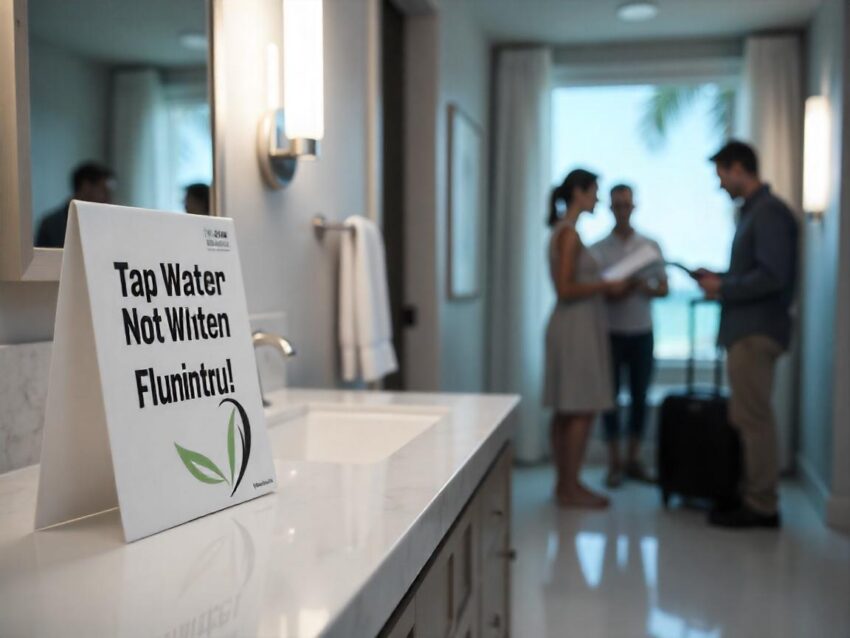Sunday, May 18, 2025

Florida ends water fluoridation under the sweeping new Farm Bill, and what’s unfolding now is sending shockwaves far beyond public policy. The moment Governor Ron DeSantis signed the bill, a quiet controversy exploded into a national debate. The decision has triggered a growing public health backlash—and it’s only just beginning.
The Farm Bill, passed without a clear mention of fluoride, includes restrictions that effectively eliminate it from Florida’s water systems. Supporters argue it’s about freedom of choice. But critics see it as a direct threat to long-standing public health protections. For many, this is more than a legislative change—it’s a breaking point.
The real surprise? The unforeseen consequences for Florida’s travel, tourism, and hospitality sectors. Suddenly, resorts, hotels, spas, and even cafes are being pulled into the debate. Travelers are asking questions. Parents are raising concerns. Health-conscious tourists are thinking twice.
In a state where image is everything, where sunshine and wellness drive entire industries, removing fluoride has become more than a health issue—it’s a branding crisis.
Meanwhile, businesses scramble to adjust. Some are investing in private filtration. Others are revisiting health and safety messaging. Across the board, uncertainty is rising.
You won’t believe what just happened—but you’re already feeling the ripple.
Florida’s decision to end water fluoridation could change how the state is perceived, not just by residents, but by the millions who visit each year. The question now is: how deep will the impact go—and who will feel it next?
Florida, a state known for its pristine beaches, bustling theme parks, and booming hospitality industry, has just taken a surprising step—eliminating fluoride from its public water systems. Signed into law as part of the SB 700 Florida Farm Bill, this quiet policy shift could reshape more than just dental hygiene. It might ripple far beyond health—into travel, tourism, and hospitality.
Though the legislation doesn’t mention fluoride by name, it targets chemical additives in municipal water systems. Critics argue that it directly threatens long-standing water fluoridation practices, which have been in place for decades as a cornerstone of public dental health.
The result? A state divided—and an industry on edge.
Tourism Meets Health Policy in a New Controversy
Florida attracts over 130 million visitors annually. Many flock to the state for relaxation, wellness, and sunshine. But what happens when a health-related decision begins to impact perception?
Wellness tourism, a fast-growing sector that includes spa retreats, health-conscious resorts, and water-focused experiences, may be the first to feel the heat. Travelers seeking high health standards might now think twice. Hotels and resorts advertising wellness-focused amenities could be caught in the crossfire of a controversial public health decision.
Water quality matters. And as headlines spread globally, potential tourists may start to question: What’s really in Florida’s tap?
Hospitality and Local Businesses Brace for Impact
Florida’s hospitality sector, already navigating labor shortages, rising costs, and climate-related uncertainty, now faces a new challenge. If public concern grows over fluoride removal, restaurants, spas, hotels, and wellness centers may see reputational strain.
Health-conscious guests may ask for bottled water more often. Coffee shops and bakeries could feel the pressure to address water quality openly. Even large resorts may need to install private filtration systems to meet traveler expectations.
Moreover, theme parks, often catering to children and families, may be urged to respond publicly. Silence might not be an option as parental advocacy groups raise concerns.
Rural and Budget Travelers Could Be Hit the Hardest
The end of fluoridation won’t be felt evenly. In urban tourist hubs like Orlando and Miami, high-end properties may easily pivot. But budget travelers and local residents relying on public water—especially in rural areas—will bear the brunt.
For many travelers, especially families visiting on tight budgets, tap water is the default. It’s what they use in hotel rooms, vacation rentals, campgrounds, and restaurants.
The removal of fluoride could lead to an uptick in dental issues over time, particularly for low-income tourists and seasonal workers. This potential health shift could add to long-term medical costs and further stress public health systems.
The Bigger Picture: National Policy and Travel Perception
Florida isn’t alone. It follows Utah, which made a similar move in March. And with health leaders like Robert F. Kennedy Jr. challenging national fluoridation recommendations, more states could soon follow.
This fuels a larger concern. Could a national rollback of fluoridation policies alter global perceptions of U.S. travel health standards?
International visitors often equate American travel with reliable infrastructure. A public health reversal—especially in a top-tier destination like Florida—may challenge that image.
Wellness certification bodies, travel insurers, and international travel agents may reconsider how they rate or promote destinations impacted by water policy shifts.
The Call for Transparency and Informed Travel
As 2025 unfolds, the spotlight will grow. Travelers will ask questions. Hospitality brands will be forced to answer. And Florida’s tourism-driven economy may have to navigate a tricky balancing act: promoting personal choice without sacrificing public trust.
Some tourism boards may now consider transparency campaigns. Others may adopt enhanced wellness certifications to assure concerned travelers. Water filtration companies and eco-hotels may see this moment as an opportunity.
What’s Next for Florida and Global Tourism?
This change in Florida isn’t just about a chemical. It’s about trust, perception, and policy. Travel, wellness, and public health are more intertwined than ever.
As the conversation around fluoride shifts from dental health to tourism strategy, the ripple effects will be closely watched. Whether this is the start of a new health trend or a short-lived controversy, one thing is certain:
Travelers notice. And so does the world.






